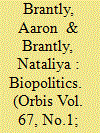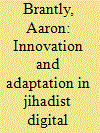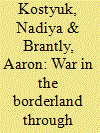| Srl | Item |
| 1 |
ID:
192576


|
|
|
|
|
| Summary/Abstract |
COVID-19 and the subsequent global response have had a profound impact on the public health, economic health, and political health in nearly every country. This article examines the biopolitics of power and pandemics in war. Three case studies are presented: the Spanish influenza outbreak of 1918–1920 and responses to the COVID-19 outbreak in both Syria and in eastern Ukraine. The pandemic’s impact has been particularly acute in active warzones, undermining the ability of governments and organizations to enforce public health recommendations, provide for the care of patients, secure supplies, and transmit information.
|
|
|
|
|
|
|
|
|
|
|
|
|
|
|
|
| 2 |
ID:
150985


|
|
|
|
|
| Summary/Abstract |
Online discussions among jihadists depict a community that is alert to changes both in the technology and the laws and policies of its adversaries.
|
|
|
|
|
|
|
|
|
|
|
|
|
|
|
|
| 3 |
ID:
186559


|
|
|
|
|
| Summary/Abstract |
Prior to the onset of Russia’s invasion of Ukraine, experts predicted an extensive cyber conflict. However, to date the scale of known cyberattacks has been quite modest. Pundits suggest that Ukraine’s improved cyber defenses, which it developed through its close cooperation with Western partners, is one of the possible explanations for Russia’s limited cyber front. This article interrogates this claim, outlining two plausible reasons for the limited effectiveness of Ukraine’s cyber defenses in the Kremlin’s limited cyber front. First, despite an extensive outpouring of cyber knowledge and expertise from the West, Ukraine’s cyber capabilities are still organizationally and operationally underdeveloped. Second, limited fungibility of cyber capabilities complicates interoperability between any joint operations and diminishes the West’s willingness to share their time-limited cyber tools with Ukraine. By explaining the challenges of interstate cooperation in the cyber domain, this article contributes to the literature on the role of alliances in modern warfare.
|
|
|
|
|
|
|
|
|
|
|
|
|
|
|
|